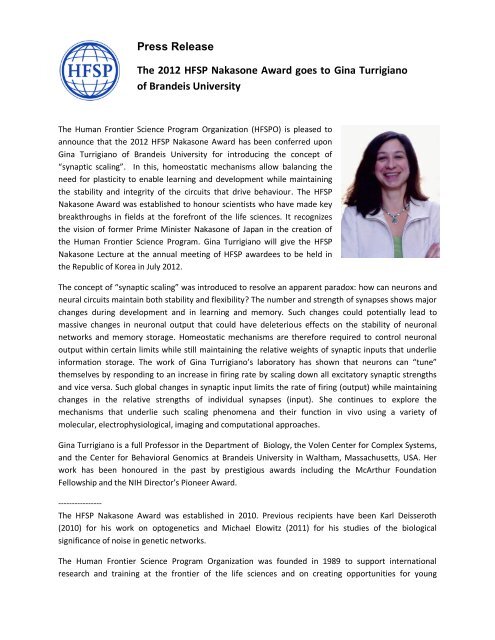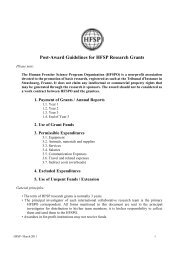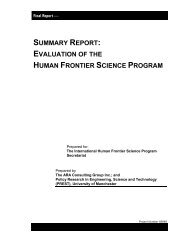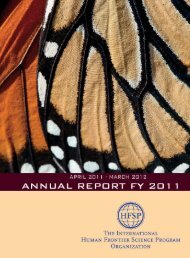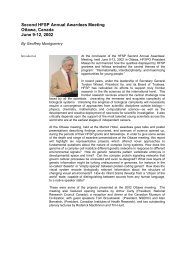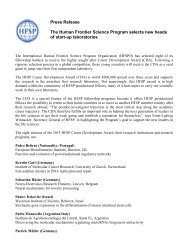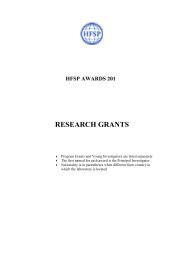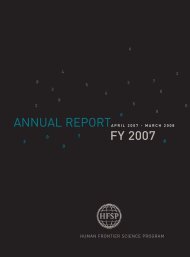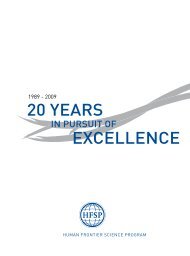The 2012 HFSP Nakasone Award goes to Gina Turrigiano of ...
The 2012 HFSP Nakasone Award goes to Gina Turrigiano of ...
The 2012 HFSP Nakasone Award goes to Gina Turrigiano of ...
Create successful ePaper yourself
Turn your PDF publications into a flip-book with our unique Google optimized e-Paper software.
Press Release<strong>The</strong> <strong>2012</strong> <strong>HFSP</strong> <strong>Nakasone</strong> <strong>Award</strong> <strong>goes</strong> <strong>to</strong> <strong>Gina</strong> <strong>Turrigiano</strong><strong>of</strong> Brandeis University<strong>The</strong> Human Frontier Science Program Organization (<strong>HFSP</strong>O) is pleased <strong>to</strong>announce that the <strong>2012</strong> <strong>HFSP</strong> <strong>Nakasone</strong> <strong>Award</strong> has been conferred upon<strong>Gina</strong> <strong>Turrigiano</strong> <strong>of</strong> Brandeis University for introducing the concept <strong>of</strong>“synaptic scaling”. In this, homeostatic mechanisms allow balancing theneed for plasticity <strong>to</strong> enable learning and development while maintainingthe stability and integrity <strong>of</strong> the circuits that drive behaviour. <strong>The</strong> <strong>HFSP</strong><strong>Nakasone</strong> <strong>Award</strong> was established <strong>to</strong> honour scientists who have made keybreakthroughs in fields at the forefront <strong>of</strong> the life sciences. It recognizesthe vision <strong>of</strong> former Prime Minister <strong>Nakasone</strong> <strong>of</strong> Japan in the creation <strong>of</strong>the Human Frontier Science Program. <strong>Gina</strong> <strong>Turrigiano</strong> will give the <strong>HFSP</strong><strong>Nakasone</strong> Lecture at the annual meeting <strong>of</strong> <strong>HFSP</strong> awardees <strong>to</strong> be held inthe Republic <strong>of</strong> Korea in July <strong>2012</strong>.<strong>The</strong> concept <strong>of</strong> “synaptic scaling” was introduced <strong>to</strong> resolve an apparent paradox: how can neurons andneural circuits maintain both stability and flexibility? <strong>The</strong> number and strength <strong>of</strong> synapses shows majorchanges during development and in learning and memory. Such changes could potentially lead <strong>to</strong>massive changes in neuronal output that could have deleterious effects on the stability <strong>of</strong> neuronalnetworks and memory s<strong>to</strong>rage. Homeostatic mechanisms are therefore required <strong>to</strong> control neuronaloutput within certain limits while still maintaining the relative weights <strong>of</strong> synaptic inputs that underlieinformation s<strong>to</strong>rage. <strong>The</strong> work <strong>of</strong> <strong>Gina</strong> <strong>Turrigiano</strong>’s labora<strong>to</strong>ry has shown that neurons can “tune”themselves by responding <strong>to</strong> an increase in firing rate by scaling down all excita<strong>to</strong>ry synaptic strengthsand vice versa. Such global changes in synaptic input limits the rate <strong>of</strong> firing (output) while maintainingchanges in the relative strengths <strong>of</strong> individual synapses (input). She continues <strong>to</strong> explore themechanisms that underlie such scaling phenomena and their function in vivo using a variety <strong>of</strong>molecular, electrophysiological, imaging and computational approaches.<strong>Gina</strong> <strong>Turrigiano</strong> is a full Pr<strong>of</strong>essor in the Department <strong>of</strong> Biology, the Volen Center for Complex Systems,and the Center for Behavioral Genomics at Brandeis University in Waltham, Massachusetts, USA. Herwork has been honoured in the past by prestigious awards including the McArthur FoundationFellowship and the NIH Direc<strong>to</strong>r’s Pioneer <strong>Award</strong>.----------------<strong>The</strong> <strong>HFSP</strong> <strong>Nakasone</strong> <strong>Award</strong> was established in 2010. Previous recipients have been Karl Deisseroth(2010) for his work on op<strong>to</strong>genetics and Michael Elowitz (2011) for his studies <strong>of</strong> the biologicalsignificance <strong>of</strong> noise in genetic networks.<strong>The</strong> Human Frontier Science Program Organization was founded in 1989 <strong>to</strong> support internationalresearch and training at the frontier <strong>of</strong> the life sciences and on creating opportunities for young
scientists. It is supported by contributions from Australia, Canada, France, Germany, India, Italy, Japan,Republic <strong>of</strong> Korea, New Zealand, Norway, Switzerland, the United States <strong>of</strong> America, the UnitedKingdom and the European Commission, which represents the non-G7 states <strong>of</strong> the European Union.With its collaborative research grants and postdoc<strong>to</strong>ral fellowship programs it has supportedapproximately 5500 scientists from 65 countries over the last 20 years.


